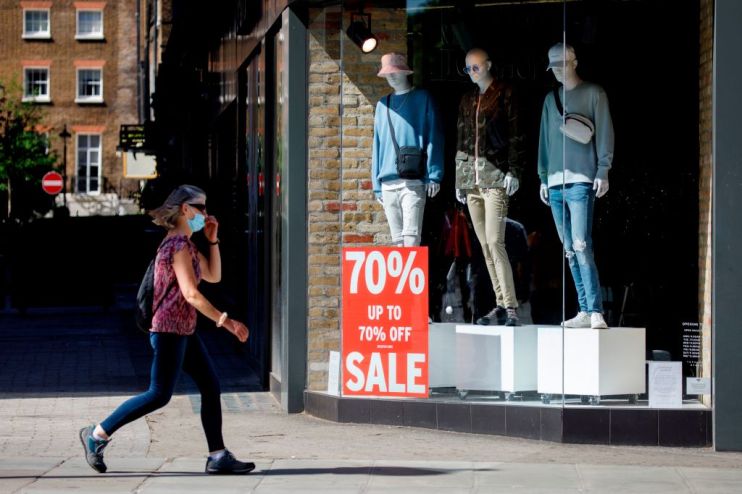Coronavirus crisis: How far will the UK economy fall in 2020?

HSBC last week became the latest big institution to downgrade its forecasts for the UK economy and disagree strongly with the Bank of England’s rosy expectations.
It said the historic 20.4 per cent slump in GDP in the second quarter “was worse than we had expected”. The lender said it was therefore now “more pessimistic” about growth.
On average, forecasters making predictions in August thought the economy would contract by around 10 per cent this year, according to Treasury analysis published last week. That would be by far the worst performance since figures began in 1949.
The average estimate for 2021 growth was 6.6 per cent, meaning the UK economy would take well over two years to claw its way back to its pre-coronavirus size.
But the Bank of England has been much more upbeat than most other forecasters. Earlier this month it predicted a quick rebound would help the economy recover its 2019 size by the end of next year.
So, there’s a great deal of uncertainty about the path of the economy. But here’s what five major institutions think is going to happen to the UK economy this year, and why they think it.
Bank of England
The Bank of England said earlier this month that the UK economy is likely to contract by 9.5 per cent this year – an enormous hit by historical standards. However, it predicted growth will storm back with a nine per cent expansion in 2021.
Unemployment will reach 7.5 per cent by the end of this year from 3.9 per cent in February, it said, but stay lower than during the financial crisis. That would put around 2.5m people out of work.
In early August, Bank governor Andrew Bailey said: “The pace of recovery in the data that we’ve had since May puts the economy ahead of where we thought it would be in May.”
However, Bailey cautioned that the rebound is not “necessarily a good guide to the immediate future”.
Capital Economics
The economics consultancy Capital Economics recently improved its forecasts, making them the same as the BoE’s: a 9.5 per cent contraction this year followed by nine per cent growth in 2021.
It said the second-quarter GDP figures showed that the economy was already growing again. Capital Economics pointed to the 8.7 per cent month-on-month growth in June, which was above expectations.
Yet it cautioned: “The pace of the recovery will probably soon slow as the wind down of the furlough scheme from now to the end of October means employment falls more significantly.”
The consultancy said that meant the economy may take 12-18 months to recoup its losses. Therefore “it’s going to feel like we are in a recession for a long time yet”.

HSBC
HSBC stated plainly that it disagreed with the Bank of England’s assessment when it downgraded its own predictions last week.
The UK’s biggest bank said it thinks the economy will shrink by 10.3 per cent this year and only grow by six per cent the next. That would mean the economy is nowhere near recovering its pre-coronavirus size by the end of 2021, as the BoE predicted.
HSBC said that unlike the Bank of England and Capital Economics, “recent data outturns have made us more pessimistic about the lasting economic impact”.
The lender pointed to official figures from the end of July that showed only 5.5 per cent of those who had been furloughed had returned to work.
Office for Budget Responsibility (OBR)
The UK’s budget watchdog hedged its bets, producing three “scenarios” in mid-July, each of which said the economy would shrink more than 10 per cent in 2020.
Its “central scenario” said GDP is likely to drop by an enormous 12.4 per cent in 2020. The economy would grow 8.7 per cent the year after, taking until the end of 2022 to reach its pre-Covid size.
The OBR said “long-term scarring” would hold back the economy. It said rising levels of unemployment, falling business investment, and company failures would be damaging in all but the best scenario.
However, the watchdog was keen to stress that high levels of uncertainty meant it had only produced “scenarios, not forecasts”.
EY Item Club
Writing at the end of July, the EY Item Club released one of the most pessimistic forecasts, predicting a huge 11.5 per cent contraction in the UK economy in 2020. The figure was considerably worse than the eight per cent drop it had predicted in June.
The Item Club, a forecaster sponsored by auditor EY, predicted GDP will only grow 6.5 per cent in 2021. Item Club said the economy would only limp back to its pre-coronavirus size by the end of 2024 – a far more pessimistic scenario than the Bank of England’s.
EY chief economist Mark Gregory said data at the end of July showed that “the public is not yet willing to return to pre-COVID-19 patterns of behaviour”. He cited lower footfall in shopping areas and a lack of people returning to work, among other figures.
Yet he cautioned: “This remains a very uncertain environment with the outlook changing regularly with significant downside risks.”